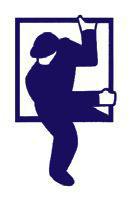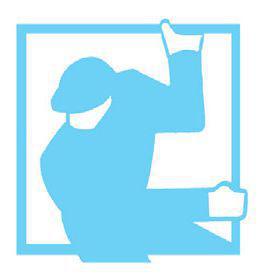SAS Urban Survival Handbook (59 page)
Read SAS Urban Survival Handbook Online
Authors: John Wiseman
Tags: #Health & Fitness, #Reference, #Survival, #Fiction, #Safety, #Self-Help, #Personal & Practical Guides, #General, #Survival Skills


WARNING
Jumping to safety: With any type of fall there is a risk of injury. You should ONLY consider this as a last resort to escape fire. Risks increase greatly with every storey above the first floor. Jumping from the third floor and above must only be considered if there really is no other choice. Even if the ground is not hard, the fall could prove fatal.
REMEMBER
If you can make your way to the roof, move with extreme caution. If it is a pitched roof, stay on the windward side away from smoke. Attract attention by waving and shouting, NOT by throwing roof tiles or heavy objects to the ground—you could kill or injure someone below.

WARNING
Most roof surfaces are extremely treacherous. Slates or tiles may easily become dislodged beneath you. Sheet roofs may easily collapse—causing you to fall through. Assess the risk!
Getting help
Once you have escaped from a burning building you should still follow your pre-planned drill. This will help you account for the occupants of a building. The fire brigade must be called immediately – do NOT assume this has already been done. Delegate someone to telephone from a call box or from a neighbour’s home (see
Equipment & drills
) and make sure the full address and location of the fire is given.
REMEMBER
Do not let ANYONE other than a trained fire-fighter enter a burning building. However brave you think you are, an untrained ill-equipped person is no match for a blaze. Resist the urge.
Outside
Get clear as soon as possible. Do NOT hamper fire-fighting or rescue operations. Beware falling debris—the whole building may collapse. If you are injured, make the fact known to medical personnel—but accept the fact that the most life-threatening injuries must be dealt with first. People may be very frightened or upset. Try to keep calm and reassure others.
Security
No one wants to live or work in a fortress, but you must
protect yourself from the risk of attack by intruders. Thieves and vandals seem to be more daring than ever—you’ll have to do more than fit locks to keep them out.
SAFE & SECURE
Burgled!
HOME SECURITY
Visibility • Keeping intruders out • Danger points • How burglars get in
• Marking property • Burlgars’ top ten • Door locks • Who’s there? • Entryphones • Limiters/chains
• Window locks • Alarm systems • False alarms • Panic buttons • Keep watch • Leaving the house
• Returning home • Intruders at night
SECURITY AT WORK
Reception desks • Walk-in theft • Screens and checkpoints • Guards/guard patrols • Indelible evidence • Guard dogs • Safes/vaults • Countering espionage • Telephone tapping
• Bugs • Computer eavesdropping • Computer hacking • Computer viruses • Funny but deadly
VEHICLES
Cars • Radios • Motorcycles
SAFE & SECURE
 Intrusion, break-ins, theft and vandalism may not be life-threatening in themselves – but they cause an enormous amount of stress. Your home, where you normally feel safe, can be rendered uninhabitable in
Intrusion, break-ins, theft and vandalism may not be life-threatening in themselves – but they cause an enormous amount of stress. Your home, where you normally feel safe, can be rendered uninhabitable in
minutes. The fact that ANYONE has entered your property by force can be very traumatic. Burglars could wreck a home – or empty it! At the very worst, you may be injured or even murdered by intruders. At work, apart from the loss of valuable equipment and man-hours, priceless data may be destroyed if computer systems are sabotaged. Competitors may take extreme measures to secure highly valuable information.
Insurance policies may cover basic replacement of stolen or damaged property, but money cannot replace possessions of great sentimental value or the time spent decorating and furnishing your home. At work, it may be even more difficult to assess the extent of the damage done, including the loss of business advantages.
Many burglaries involve only petty theft. At home this may mean that ‘casual’ thieves are only looking for televisions and video recorders, cash and small valuables. At work ‘casual’ thieves may be more interested in cashboxes and employees’ personal possessions. Many ‘professional’ thieves aim for higher stakes—they know where there are things worth stealing and times when they can be stolen.
Take action to counter the threat of intrusion and all the damage that may be done as a result. You MUST realize that there is more to safety and security than just fitting efficient locks.
REMEMBER
The number of break-ins to homes and offices every week is huge – and steadily increasing. In many cases, unless there is physical attack, arson or something very valuable has been stolen, there is little the police can do. Fingerprinting (when it takes place at all) does more to reassure you that something is being done. Tell the police if you have marked your possessions in any way, provide photographs of valuables and any information which may assist them in the recognition or recovery of your possessions.

EMERGENCY!
BURGLED!
▶
If you arrive at your home/work and have reason to suspect that A BURGLARY IS TAKING PLACE
DO NOT GO IN
If you think that intruders may still be inside, call the police and find a safe vantage point—outside or at a neighbour’s. You may see the thieves leaving. Be ready to jot down descriptions of people/vehicles Do NOT attempt to apprehend the thieves
IF YOU ARRIVE ON FOOT
Walk on. If you have already reached the door, turn round and get away as fast as possible
IF YOU ARRIVE BY CAR
Drive on. Park where you will be safe, call the police and keep an eye on the property. If you have already pulled into a driveway, pretend you were using it to turn the car round. Back out and drive off
IF YOU DISTURB INTRUDERS
GET OUT! Do NOT call out. Do NOT block likely exit routes
▶
If you arrive at your home/work and have reason to suspect that A BURGLARY HAS TAKEN PLACE
DO NOT TOUCH ANYTHING
If the thieves have left, call the police. While you wait, start a visual search to ascertain what is missing. If distressed or unable to cope alone, call a friend to be with you, go to a neighbour’s or wait outside for the police to arrive
▶
If you hear intruders at night
Do NOT leave the room. Do not attempt to apprehend the thief.
Look for something to defend yourself with. If you have a bedside telephone, call the police immediately. If not, wait until the intruder has left. Move about noisily, turn lights on and hold a conversation. If you are alone, pretend to be talking to a male companion
HOME SECURITY
 Ground floor and basement properties are the most vulnerable. Detached houses, especially when set well back from the road and screened by walls, fences, trees and bushes, are easy targets. They may suggest a wealthier
Ground floor and basement properties are the most vulnerable. Detached houses, especially when set well back from the road and screened by walls, fences, trees and bushes, are easy targets. They may suggest a wealthier
lifestyle and more valuables—it is also less likely that the burglar will be observed by neighbours or passers-by. Properties backing on to wasteland, alleyways, public parks and other routes allowing easy access (and getaway!) have a greater risk of burglary. An adjacent building site or scaffolding makes a house particularly vulnerable.
You don’t have to be wealthy to be burgled! Most homes have a television, stereo, video equipment or other electrical items—all relatively easy to dispose of. Small items such as cash, cameras, watches, medals and jewellery may be slipped into pockets—an important consideration if you have to leave a house by climbing out of an upstairs window!
You can improve the security of the site where you live and also make the house itself more difficult to break into. Security is also an important consideration when looking for a new home—knowing some of the high-risk factors could be one of the influences in your choice.
Visibility
Balance your need for privacy against that for security. Fences, shrubbery and trees screening your home will all give intruders cover. Keep hedges low so that the entrances to your home can be seen over them—thorny ones may help to deter people from trying to break through them.
Garden walls and fences are less easy to climb if they have trelliswork mounted on top of them. Make it too high and too frail to be climbed. This won’t keep out a determined burglar but will deter the opportunist. Such protection is only effective if there are no sections of the perimeter where a wall, roof or other solid structure allows easy access or a weak gate provides entry at ground level.